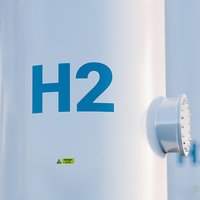Green Hydrogen Production in Germany: More Competitive than Expected
Study on demand, costs and development paths of hydrogen in Germany now available in English

Study on demand, costs and development paths of hydrogen in Germany now available in English

The production of green hydrogen in Germany is more competitive than expected compared to imports. This is the key finding of a meta-analysis conducted by the Wuppertal Institute on behalf of the North Rhine-Westphalia Association for Renewable Energies (Landesverband Erneuerbare Energien NRW). The study is now available in English.
The hydrogen study focuses primarily on the year 2030 and beyond – and confirms the advantages of green hydrogen produced in Germany from domestic renewable energies, especially when the evaluation is viewed from a holistic system perspective.
"Strengthening a domestic green hydrogen economy makes sense, not least because of the value added in Germany. There are not necessarily cost advantages associated with importing hydrogen," says Prof. Dr.-Ing. Manfred Fischedick, President and Scientific Managing Director of the Wuppertal Institute. The study also shows that blue hydrogen based on natural gas is not the hoped-for transitional solution: From today's perspective, larger quantities of blue hydrogen will not be available before 2030, as the necessary production facilities and transport pipelines still need to be built. From a long-term perspective, the problem is that complete CO2 neutrality is not achievable due to the limited rate of carbon capture during production from natural gas.
According to the study, there is another argument in favor of greater national production of green hydrogen than previously planned: The expected production costs for green hydrogen in Germany have decreased in recent years, according to current studies. They lie mostly below the import costs of hydrogen that comes to Germany by ship and are in many cases also competitive with the import of hydrogen by pipeline.
In addition to the production side, the application side also plays a major role in a future hydrogen economy: "To make efficient use of the hydrogen production possible by 2030, we advocate focusing hydrogen use on absolutely necessary applications. This helps to limit future hydrogen demand – and thus also reduces the required production and import volumes. Examples include the steel or chemical industries, which cannot become climate-neutral without green hydrogen. Extensive use of hydrogen in the building and transport sectors, on the other hand, is not advisable from today's perspective," emphasises study author Frank Merten, Co-Head of the Systems and Infrastructures Research Unit at the Wuppertal Institute.
The study can be downloaded free of charge via the link below.
